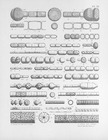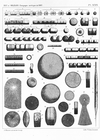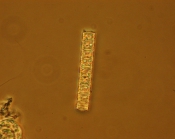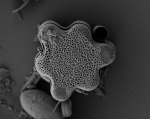
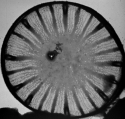
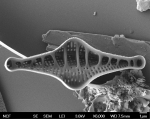
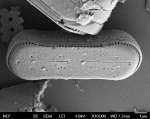
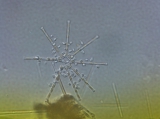
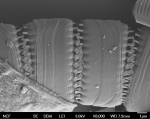
DiatomBase
WoRMS taxon details
Paralia sulcata (Ehrenberg) Cleve, 1873
149055 (urn:lsid:marinespecies.org:taxname:149055)
accepted
Species
Gaillionella sulcata Ehrenberg, 1838 · unaccepted
Orthoseira marina W.Smith, 1856 · unaccepted (synonym)
marine, brackish, fresh, terrestrial
Not documented
Distribution neritic and littoral; occasionally found in the plankton; probably cosmopolitan
Distribution neritic and littoral; occasionally found in the plankton; probably cosmopolitan [details]
Kociolek, J.P.; Blanco, S.; Coste, M.; Ector, L.; Liu, Y.; Karthick, B.; Kulikovskiy, M.; Lundholm, N.; Ludwig, T.; Potapova, M.; Rimet, F.; Sabbe, K.; Sala, S.; Sar, E.; Taylor, J.; Van de Vijver, B.; Wetzel, C.E.; Williams, D.M.; Witkowski, A.; Witkowski, J. (2025). DiatomBase. Paralia sulcata (Ehrenberg) Cleve, 1873. Accessed through: World Register of Marine Species at: https://www.marinespecies.org/aphia.php?p=taxdetails&id=149055 on 2025-07-14
![]() The webpage text is licensed under a Creative Commons
Attribution 4.0 License
The webpage text is licensed under a Creative Commons
Attribution 4.0 License
Nomenclature
basis of record
Muylaert, K.; Sabbe, K. (1999). Spring phytoplankton assemblages in and around the maximum turbidity zone of the estuaries of the Elbe (Germany), the Schelde (Belgium/The Netherlands) and the Gironde (France). <i>J. Mar. Syst. 22</i>: 133-149 (look up in IMIS) [details]
Other
context source (HKRMS)
Huang, B. Q.; Hong, H. S.; Wong, Y. S. (1997). Diatoms in the sediments of Victoria Harbour, Hong Kong. <em>In: Morton B, editor. Asian Marine Biology 13. Hong Kong University Press, Hong Kong.</em> 45-51. [details]
context source (RAS) Australian Antarctic Data Centre. , available online at https://data.aad.gov.au/aadc/biodiversity/ [details]
context source (Schelde) Maris, T., O. Beauchard, S. Van Damme, E. Van den Bergh, S. Wijnhoven & P. Meire. (2013). Referentiematrices en Ecotoopoppervlaktes Annex bij de Evaluatiemethodiek Schelde-estuarium Studie naar “Ecotoopoppervlaktes en intactness index”. [Reference matrices and Ecotope areas Annex to the Evaluation methodology Scheldt estuary Study on “Ecotope areas and intactness index”. <em>Monitor Taskforce Publication Series, 2013-01. NIOZ: Yerseke.</em> 35 pp. (look up in IMIS) [details]
context source (Bermuda) Bodungen, B. V.; Jickells, T. D.; Smith, S. R.; Ward, J. A. D. ; Hillier, G. B. (1982). The Bermuda Marine Environment - Volume III The final report of the Bermuda Inshore Waters Investigations 1975-1980. BBSR Special Publication # 18, 3: 123 pp. [details]
additional source Tomas, C.R. (Ed.). (1997). Identifying marine phytoplankton. Academic Press: San Diego, CA [etc.] (USA). ISBN 0-12-693018-X. XV, 858 pp., available online at http://www.sciencedirect.com/science/book/9780126930184 [details]
additional source Horner, R. A. (2002). A taxonomic guide to some common marine phytoplankton. <em>Biopress Ltd. Bristol.</em> 1-195. [details]
additional source Linkletter, L. E. (1977). A checklist of marine fauna and flora of the Bay of Fundy. <em>Huntsman Marine Laboratory, St. Andrews, N.B.</em> 68: p. [details]
additional source Thomas, M. L. H. (1983). Marine and coastal systems of the Quoddy Region, New Brunswick. <em>Canadian Special Publication of Fisheries and Aquatic Sciences.</em> 64:1-306. [details] Available for editors [request]
[request]
additional source Hällfors, G. (2004). Checklist of Baltic Sea Phytoplankton Species (including some heterotrophic protistan groups). <em>Baltic Sea Environment Proceedings.</em> No. 95: 210 pp., available online at http://helcom.fi/Lists/Publications/BSEP95.pdf [details] Available for editors [request]
[request]
additional source Muller, Y. (2004). Faune et flore du littoral du Nord, du Pas-de-Calais et de la Belgique: inventaire. [Coastal fauna and flora of the Nord, Pas-de-Calais and Belgium: inventory]. <em>Commission Régionale de Biologie Région Nord Pas-de-Calais: France.</em> 307 pp., available online at http://www.vliz.be/imisdocs/publications/145561.pdf [details]
additional source Fourtanier, E. & Kociolek, J. P. (compilers). (2011). Catalogue of Diatom Names. California Academy of Sciences, On-line Version. Updated 2011-09-19., available online at http://researcharchive.calacademy.org/research/diatoms/names/index.asp [details]
additional source Krayesky, D. M.; Meave, D. C.; Zamudio, E.; Norris, E.; Fredericq, S.; Tunnell, J. (2009). Diatoms (Bacillariophyta) of the Gulf of Mexico. <em>Gulf of Mexico origin, waters, and biota.</em> 1: 155-186. [details] Available for editors [request]
[request]
additional source Harper, M.A.; Cassie Cooper, V.; Chang, F.H.; Nelson, W.A.; Broady, P.A. (2012). Phylum Ochrophyta: brown and golden-brown algae, diatoms, silicoflagellates, and kin, in: Gordon, D.P. (Ed.) (2012). New Zealand inventory of biodiversity: 3. Kingdoms Bacteria, Protozoa, Chromista, Plantae, Fungi. pp. 114-163. [details]
additional source Meunier, A. (1915). Microplankton de la Mer Flamande: 2. Les Diatomacées (suite) (Le Genre Chaetoceros excepté). Mémoires du Musée Royal d'Histoire Naturelle de Belgique = Verhandelingen van het Koninklijk Natuurhistorisch Museum van België, VII(3). Hayez, imprimeur de l'Académie royale de Belgique: Bruxelles. 182 pp. [details]
additional source Integrated Taxonomic Information System (ITIS). , available online at http://www.itis.gov [details]
context source (RAS) Australian Antarctic Data Centre. , available online at https://data.aad.gov.au/aadc/biodiversity/ [details]
context source (Schelde) Maris, T., O. Beauchard, S. Van Damme, E. Van den Bergh, S. Wijnhoven & P. Meire. (2013). Referentiematrices en Ecotoopoppervlaktes Annex bij de Evaluatiemethodiek Schelde-estuarium Studie naar “Ecotoopoppervlaktes en intactness index”. [Reference matrices and Ecotope areas Annex to the Evaluation methodology Scheldt estuary Study on “Ecotope areas and intactness index”. <em>Monitor Taskforce Publication Series, 2013-01. NIOZ: Yerseke.</em> 35 pp. (look up in IMIS) [details]
context source (Bermuda) Bodungen, B. V.; Jickells, T. D.; Smith, S. R.; Ward, J. A. D. ; Hillier, G. B. (1982). The Bermuda Marine Environment - Volume III The final report of the Bermuda Inshore Waters Investigations 1975-1980. BBSR Special Publication # 18, 3: 123 pp. [details]
additional source Tomas, C.R. (Ed.). (1997). Identifying marine phytoplankton. Academic Press: San Diego, CA [etc.] (USA). ISBN 0-12-693018-X. XV, 858 pp., available online at http://www.sciencedirect.com/science/book/9780126930184 [details]
additional source Horner, R. A. (2002). A taxonomic guide to some common marine phytoplankton. <em>Biopress Ltd. Bristol.</em> 1-195. [details]
additional source Linkletter, L. E. (1977). A checklist of marine fauna and flora of the Bay of Fundy. <em>Huntsman Marine Laboratory, St. Andrews, N.B.</em> 68: p. [details]
additional source Thomas, M. L. H. (1983). Marine and coastal systems of the Quoddy Region, New Brunswick. <em>Canadian Special Publication of Fisheries and Aquatic Sciences.</em> 64:1-306. [details] Available for editors
additional source Hällfors, G. (2004). Checklist of Baltic Sea Phytoplankton Species (including some heterotrophic protistan groups). <em>Baltic Sea Environment Proceedings.</em> No. 95: 210 pp., available online at http://helcom.fi/Lists/Publications/BSEP95.pdf [details] Available for editors
additional source Muller, Y. (2004). Faune et flore du littoral du Nord, du Pas-de-Calais et de la Belgique: inventaire. [Coastal fauna and flora of the Nord, Pas-de-Calais and Belgium: inventory]. <em>Commission Régionale de Biologie Région Nord Pas-de-Calais: France.</em> 307 pp., available online at http://www.vliz.be/imisdocs/publications/145561.pdf [details]
additional source Fourtanier, E. & Kociolek, J. P. (compilers). (2011). Catalogue of Diatom Names. California Academy of Sciences, On-line Version. Updated 2011-09-19., available online at http://researcharchive.calacademy.org/research/diatoms/names/index.asp [details]
additional source Krayesky, D. M.; Meave, D. C.; Zamudio, E.; Norris, E.; Fredericq, S.; Tunnell, J. (2009). Diatoms (Bacillariophyta) of the Gulf of Mexico. <em>Gulf of Mexico origin, waters, and biota.</em> 1: 155-186. [details] Available for editors
additional source Harper, M.A.; Cassie Cooper, V.; Chang, F.H.; Nelson, W.A.; Broady, P.A. (2012). Phylum Ochrophyta: brown and golden-brown algae, diatoms, silicoflagellates, and kin, in: Gordon, D.P. (Ed.) (2012). New Zealand inventory of biodiversity: 3. Kingdoms Bacteria, Protozoa, Chromista, Plantae, Fungi. pp. 114-163. [details]
additional source Meunier, A. (1915). Microplankton de la Mer Flamande: 2. Les Diatomacées (suite) (Le Genre Chaetoceros excepté). Mémoires du Musée Royal d'Histoire Naturelle de Belgique = Verhandelingen van het Koninklijk Natuurhistorisch Museum van België, VII(3). Hayez, imprimeur de l'Académie royale de Belgique: Bruxelles. 182 pp. [details]
additional source Integrated Taxonomic Information System (ITIS). , available online at http://www.itis.gov [details]
 Present
Present  Present in aphia/obis/gbif/idigbio
Present in aphia/obis/gbif/idigbio  Inaccurate
Inaccurate  Introduced: alien
Introduced: alien  Containing type locality
Containing type locality
Unreviewed
Diet phytosynthetic [details]Distribution neritic and littoral; occasionally found in the plankton; probably cosmopolitan [details]
Habitat pelagic or attached to various marine life [details]
Importance most abundant phylum of algae [details]
Morphology yellow brown in color, not green [details]
Predators marine microorganisms and animal larvae [details]
Reproduction general for group: both sexual and asexual [details]
PlanktonNet Image
To Barcode of Life
To Biodiversity Heritage Library (101 publications)
To Biodiversity Heritage Library (4 publications) (from synonym Gaillionella sulcata Ehrenberg, 1838)
To Dyntaxa
To European Nucleotide Archive, ENA (Paralia sulcata)
To GenBank (17 nucleotides; 316 proteins)
To NHMUK collection (Orthoseira marina W.Sm.; NHMUK:ecatalogue:4728864) (from synonym Orthoseira marina W.Smith, 1856)
To PESI (from synonym Gaillionella sulcata Ehrenberg, 1838)
To PESI (from synonym Orthoseira marina W.Smith, 1856)
To PESI
To ITIS
To Barcode of Life
To Biodiversity Heritage Library (101 publications)
To Biodiversity Heritage Library (4 publications) (from synonym Gaillionella sulcata Ehrenberg, 1838)
To Dyntaxa
To European Nucleotide Archive, ENA (Paralia sulcata)
To GenBank (17 nucleotides; 316 proteins)
To NHMUK collection (Orthoseira marina W.Sm.; NHMUK:ecatalogue:4728864) (from synonym Orthoseira marina W.Smith, 1856)
To PESI (from synonym Gaillionella sulcata Ehrenberg, 1838)
To PESI (from synonym Orthoseira marina W.Smith, 1856)
To PESI
To ITIS
Unreviewed

